人版七年级英语(下册)第五单元知识点总结
人教版七年级下册英语 Unit 5 语法知识点复习提纲

人教版七年级下册英语Unit 5 语法知识点复习提纲Unit5 Why do you like pandas?单元目标总览:【知识点详解】1、Let’s see the pandas first.(1)本句是一个祈使句,句式为“Let’s do sth.”意为“让我们……吧。
”主要用来提出建议和请求, 劝对方一起做,包括听话者在内。
它的否定式是“Let’s not do sth.”,意为“让我们不做某事”。
◆Let’s play games together. 我们一起做游戏吧。
◆Let’s not tell anyone. 我们谁也别告诉。
(2)“Let us do sth.” 意为“让/允许我们做某事”,表示提出请求,请对方允许,不包括听话者在内。
◆Let us go with you, my dear mother. 亲爱的妈妈,让我们和你一起去吧。
2、Because they are cute.因为他们非常可爱。
cute形容词,“聪明的,可爱的”,多指小动物聪明可爱,也可以指小女孩聪明伶俐,招人喜爱。
◆The panda is very cute. 熊猫很可爱。
3、Why do you like pandas?(1)本句是why引导的特殊疑问句,用来询问原因;它的句式是“Why + be动词/ 情态动词/ 助动词+ 主语+ 动词?”。
意为“为什么做……”。
这个句式常用because引导的句子来回答。
because是连词,表示直接的理由。
◆-Why is he here? 他为什么在这儿?-Because he has things to do. 因为他有事要做。
◆-Why do you study English?你为什么学英语?-Because it’s important. 因为它很重要。
(2)why还可以表示建议,常用于句型“Why not + do sth.?或Why don’t you + do sth.?”意为“为什么不……?”。
完整版)人教版七年级英语下册第五单元知识点总结
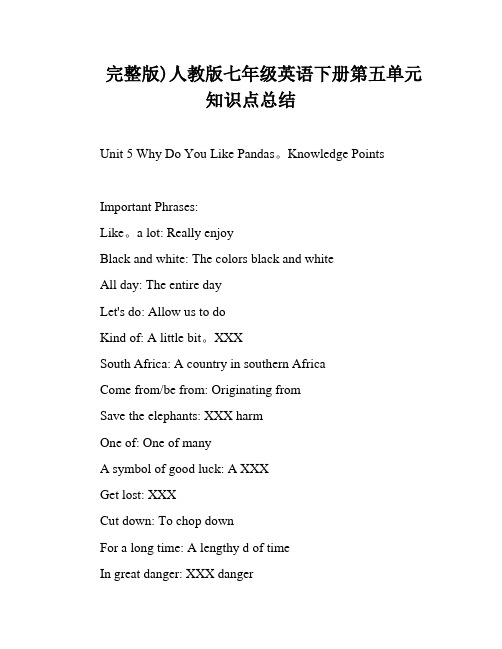
完整版)人教版七年级英语下册第五单元知识点总结Unit 5 Why Do You Like Pandas。
Knowledge PointsImportant Phrases:Like。
a lot: Really enjoyBlack and white: The colors black and whiteAll day: The entire dayLet's do: Allow us to doKind of: A little bit。
XXXSouth Africa: A country in southern AfricaCome from/be from: Originating fromSave the elephants: XXX harmOne of: One of manyA symbol of good luck: A XXXGet lost: XXXCut down: To chop downFor a long time: A lengthy d of timeIn great danger: XXX dangerXXX ivory: XXXPlaces with food and water: XXX sustenanceKill。
for: To take the life of an animal for a specific purpose1.Seeing Pandas: Observing pandas2.My Favorite Animals: XXX XXX3.e to SP: Greetings to SP4.e Back to SP: Greetings to SP upon returning5.From: Originating from6.In the Zoo: Located in a zoo7.On the Farm: Located on a farm8.My New Pet: XXX9.XXX: Bipedal movement10.Kind of: XXX11.Kind of Interesting: XXX12.A XXX: XXX13.A Little Boring: XXX14.A Kind of: A type of15.All Kinds of: Many different types of16.All Day: The entire day17.A Good Name for XXX: A fitting name for a person18.South Africa: A country in southern Africa19.South China: The southern n of China20.South America: The southern n of the Americas21.America。
七年级下册人教版u5知识点总结

七年级下册人教版u5知识点总结本文将为大家总结七年级下册人教版英语Unit 5的知识点,包括词汇、语法、听力和阅读等方面的内容。
希望本文能为大家学习英语提供帮助。
词汇1. 单词记忆和拼写Unit 5的词汇量较大,包括生词和短语共计80余个,其中部分单词拼写相对较难。
在学习时,需要重点掌握拼写和发音。
2. 词义记忆和运用在学习词汇的过程中,要注重理解单词的词义,并学会在语境中灵活运用。
可以通过做词汇练习、朗读语音练习和与他人对话等方式进行巩固和提高。
语法1. 简单过去时态在本单元中,我们主要学习了一般过去时态的构成和用法。
需要注意三种不规则动词的变化形式,并学会运用过去式来描述过去发生的事件。
2. 动词的ing形式在本单元中,我们学习了动词的ing形式。
需要注意动词加ing 后的变化和用法,学会运用动词的ing形式来描述正在进行的动作。
听力在本单元中,我们主要学习了听力技巧和相关的听力实践。
需要注意听力材料的节奏和语速,并积极参与说话和发表自己的意见。
阅读1. 阅读技巧在本单元中,我们学习了一些阅读技巧,例如识别关键信息、理解文章的主题和目的等。
需要积极训练自己的阅读能力,提高阅读速度和理解能力。
2. 阅读内容本单元中的阅读内容主要包括人物传记、日常生活和校园文化等方面。
需要注意通过阅读不同类型的文章来提高自己的阅读能力,并加强对不同文化背景的了解和理解。
结语本文为大家总结了七年级下册人教版英语Unit 5的知识点,包括词汇、语法、听力和阅读等方面的内容。
在学习时,需要注重词汇记忆、语法理解、听力训练和阅读理解,通过不断练习和提高来提升自己的英语水平。
七年级下册英语unit5知识点归纳人教版
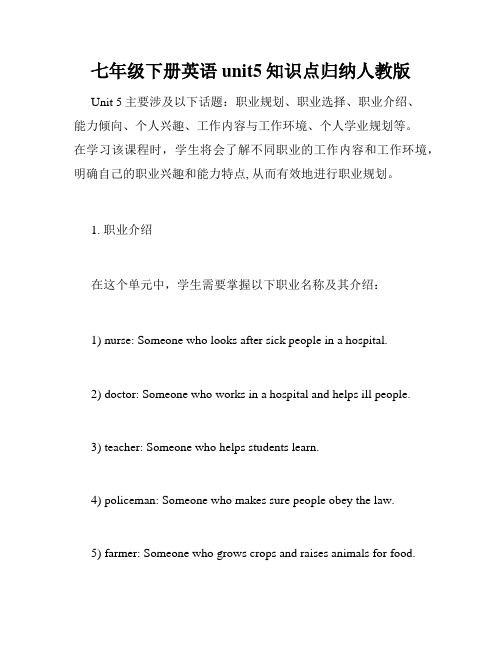
七年级下册英语unit5知识点归纳人教版Unit 5主要涉及以下话题:职业规划、职业选择、职业介绍、能力倾向、个人兴趣、工作内容与工作环境、个人学业规划等。
在学习该课程时,学生将会了解不同职业的工作内容和工作环境,明确自己的职业兴趣和能力特点, 从而有效地进行职业规划。
1. 职业介绍在这个单元中,学生需要掌握以下职业名称及其介绍:1) nurse: Someone who looks after sick people in a hospital.2) doctor: Someone who works in a hospital and helps ill people.3) teacher: Someone who helps students learn.4) policeman: Someone who makes sure people obey the law.5) farmer: Someone who grows crops and raises animals for food.通过学习和掌握这些职业名称及其介绍,学生能够更好地了解职业特征和工作内容,从而更好地规划未来的职业选择和发展路线。
2. 能力倾向和个人学习规划本单元还涉及到了能力倾向和个人学业规划的内容,学生需要了解以下几个方面:1) 能力倾向:对学生而言,了解自己的能力倾向和特点至关重要。
学生可以通过自我调查和测试了解自己的兴趣爱好、性格特点和优势劣势。
通过这些方式,学生可以更好地理解自己,寻找适合自己的职业和发展方向。
2) 个人学业规划:了解自己的兴趣和能力倾向,将对学生制定适合自己的学习规划有很大帮助。
学生可以开展面向未来的学习计划,根据自己的职业发展方向选择合适的课程和学科,以及有针对性地提高自己的能力。
3. 工作内容与工作环境本单元还涉及了工作内容与工作环境的问题,学生需要理解以下几个方面:1) 工作内容:学生需要了解各种职业的工作内容和责任,对比不同职业的优点和缺点,以便选择适合自己的职业。
人教版七年级英语下册Unit5知识点归纳

Unit5 Why do you like pandas?知识点归纳一、重点短语1. importance in Thailand 在泰国的重要性2. Let’s see…. first. 让我们先看...3. favorite animals 最喜欢的动物4. kind of interesting 有点有趣5. South Africa 南非6. be from =come from 来自7. be smart 聪明的8. walk on two legs 用两条腿走9. all day/all night 整天/整夜10. a good name for her 对于她是个好名字11. like …a lot 非常喜欢......12. black and white 黑白相间13. You’re right. 你是正确的。
14. one of +名词复数(......其中之一)15. our first flag 我们的第一面旗16. a symbol of good luck 好运的象征17. draw well 画得好18. forget to do 忘记做某事19. get/be lost 迷路20. places with food and water有食物和水的地方21. be in great danger 处于危险22. cut down 砍倒23. over = more than 超过/多于24 be made of... 由…制成25.Thai Elephant Day 大象二、用法归纳1. —Why…? 为什么……?—Because… 因为……2. let sb. do sth. 让某人做某事3. want to do sth. 想要做某事4. one of+名词复数……之一5. forget to do sth. 忘记要做某事6. forget doing sth. 忘记做过某事7. help sb. (to) do sth. 帮助某人做某事8. be friendly to sb. 对某人友好三、重点句子1. —Why do you like pandas? 你为什么喜欢熊猫?—Because they’re kind of interesting. 因为它们有点儿有趣。
(完整版)人教版七年级英语下册Unit5知识点讲解
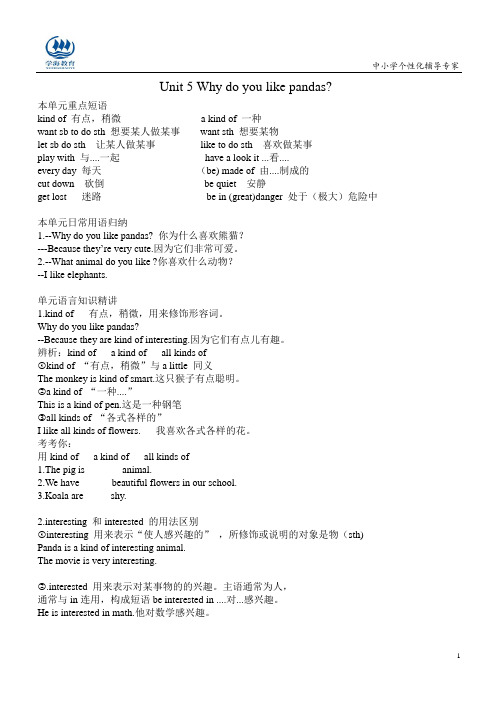
Unit 5 Why do you like pandas?本单元重点短语kind of 有点,稍微 a kind of 一种want sb to do sth 想要某人做某事want sth 想要某物let sb do sth 让某人做某事like to do sth 喜欢做某事play with 与....一起have a look it ...看....every day 每天(be) made of 由....制成的cut down 砍倒be quiet 安静get lost 迷路be in (great)danger 处于(极大)危险中本单元日常用语归纳1.--Why do you like pandas? 你为什么喜欢熊猫?---Because they’re very cute.因为它们非常可爱。
2.--What animal do you like ?你喜欢什么动物?--I like elephants.单元语言知识精讲1.kind of 有点,稍微,用来修饰形容词。
Why do you like pandas?--Because they are kind of interesting.因为它们有点儿有趣。
辨析:kind of a kind of all kinds of①kind of “有点,稍微”与a little 同义The monkey is kind of smart.这只猴子有点聪明。
②a kind of “一种....”This is a kind of pen.这是一种钢笔③all kinds of “各式各样的”I like all kinds of flowers. 我喜欢各式各样的花。
考考你:用kind of a kind of all kinds of1.The pig is _______animal.2.We have ______beautiful flowers in our school.3.Koala are _____shy.2.interesting 和interested 的用法区别①interesting 用来表示“使人感兴趣的”,所修饰或说明的对象是物(sth) Panda is a kind of interesting animal.The movie is very interesting.②.interested 用来表示对某事物的的兴趣。
七年级英语下册人教版unit5知识点归纳
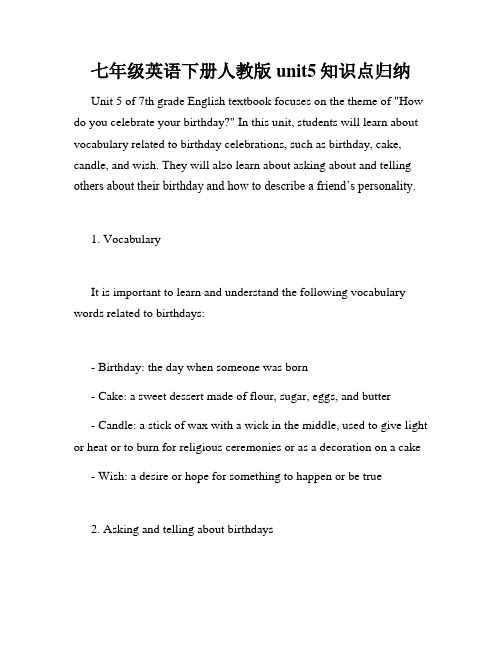
七年级英语下册人教版unit5知识点归纳Unit 5 of 7th grade English textbook focuses on the theme of "How do you celebrate your birthday?" In this unit, students will learn about vocabulary related to birthday celebrations, such as birthday, cake, candle, and wish. They will also learn about asking about and telling others about their birthday and how to describe a friend’s personality.1. VocabularyIt is important to learn and understand the following vocabulary words related to birthdays:- Birthday: the day when someone was born- Cake: a sweet dessert made of flour, sugar, eggs, and butter- Candle: a stick of wax with a wick in the middle, used to give light or heat or to burn for religious ceremonies or as a decoration on a cake- Wish: a desire or hope for something to happen or be true2. Asking and telling about birthdaysAsking and telling about birthdays is an important skill to learn to communicate with others about a significant event in their life. Here are some sentence patterns to help:- What's your birthday? My birthday is on ____________.- When is your birthday? My birthday is in _____________.- How old are you? I am ______________ years old.3. Describing a friend’s personalityIt can be fun and interesting to describe a friend’s personality. H ere are some adjectives that can be used to describe a person's personality:- Funny: someone who is able to make you laugh- Friendly: someone who is sociable and easy to talk to- Outgoing: someone who enjoys meeting new people and doing new things- Serious: someone who is focused and determined- Shy: someone who is nervous or uncomfortable in social situations- Sporty: someone who enjoys playing sports and being physically active- Talkative: someone who likes to talk a lot4. GrammarUnit 5 covers several grammatical structures that are important for 7th grade English learners:- Wh- questions: asking questions that include "who", "what", "when", "where", "why", and "how"- Personal pronouns: using pronouns to refer to people or objects in conversation, such as "I", "you", "he", "she", and "it"- Possessive adjectives: using adjectives to show ownership or possession, such as "my", "your", "his", "her", and "their"- Demonstrative pronouns: using pronouns to indicate specific objects or people, such as "this", "that", "these", and "those"5. Listening and speakingUnit 5 provides students with many opportunities to practice listening and speaking skills. Students can work in pairs or small groups to practice asking and answering questions about birthdays, describing their friends' personalities, and giving opinions on different birthday celebrations.In conclusion, Unit 5 of the 7th grade English textbook is an important unit that teaches students about vocabulary related to birthday celebrations, asking and telling about birthdays, describing a friend's personality, and key grammatical structures. By practicing these skills, students will be able to communicate better in English and have fun celebrating their birthdays with their friends.。
人教版七年级英语下册第五单元知识点汇总
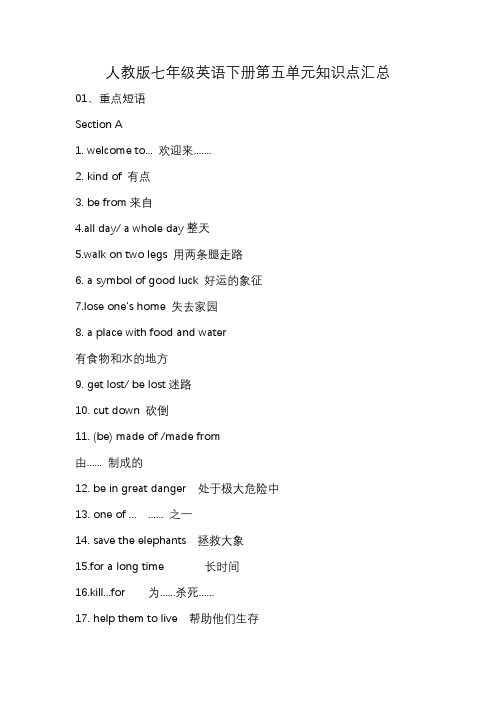
人教版七年级英语下册第五单元知识点汇总01、重点短语Section A1. welcome to... 欢迎来.......2. kind of 有点3. be from来自4.all day/ a whole day整天5.walk on two legs 用两条腿走路6. a symbol of good luck 好运的象征7.lose one’s home 失去家园8. a place with food and water有食物和水的地方9. get lost/ be lost迷路10. cut down 砍倒11. (be) made of /made from由...... 制成的12. be in great danger 处于极大危险中13. one of ... ...... 之一14. save the elephants 拯救大象15.for a long time 长时间16.kill...for 为......杀死......17. help them to live 帮助他们生存18.really scary很吓人19. South Africa 南非02、重点句子Grammar Focus 句子1. Why do you like pandas?你为什么喜欢熊猫?Because they’re kind of interesting.因为他们有点儿有趣2. Why does John like koalas?约翰为什么喜欢考拉?Because they’re very cute.因为它们非常可爱。
3. Why don’t you like tigers?你什么不喜欢老虎?Because they’re really scary.因为他们确实吓人。
4. Where are lions from?狮子来自哪里?They’re from South Africa.他们来自南非。
- 1、下载文档前请自行甄别文档内容的完整性,平台不提供额外的编辑、内容补充、找答案等附加服务。
- 2、"仅部分预览"的文档,不可在线预览部分如存在完整性等问题,可反馈申请退款(可完整预览的文档不适用该条件!)。
- 3、如文档侵犯您的权益,请联系客服反馈,我们会尽快为您处理(人工客服工作时间:9:00-18:30)。
人教版七年级下册英语第五单元Unit5 Why do you like pandas? 知识要点重要短语like…a lot 非常喜欢…black and white 黑白相间all day整天Let’s do= let us do 让我们做……kind of 有点儿,稍微South Africa南非be from/come from 来自于save the elephants救助大象one of…其中之一a symbol of good luck好运的象征get lost迷路cut down 砍倒for a long time 很长时间in great danger处于(极大)危险之中things be made of ivory由象牙制成的东西places with food and water有食物和水的地方kill……for……为……杀1.see the pandas 看熊猫2.my favorite animals我最喜欢的动物3.welcome to sp 欢迎来某地4.welcome back to sp 欢迎回到某地5.be from 来自e from来自7.in the zoo 在动物园里8.on the farm 在农场里9.my new pet 我的新宠物10.w alk on two legs 用两条腿走11.k ind of有点12.k ind of interesting有点有趣13.a little有点14.a little boring有点无聊15.a kind of一种16.a ll kinds of 各种各样的17.a ll day整天18.a good name for sb对某人是一个好名字19.S outh Africa南非20.S outh China华南21.S outh America南美洲22.A merica, the USA美国23.t he UK ,England英国24.t he South Pole南极25.w hat animals什么动物26.s ave the elephants挽救大象27.o ne of +n复数。
之一28.t he first lesson=Lesson One第一课29.c lever聪明的,机灵的30.c ute聪明的,可爱的31.s mart聪明的,顽皮的32.b right聪明的,伶俐的33.a n ugly face一张丑陋的脸34.b e friendly to…对某人友好35.b e friendly with和某人关系好36.b e kind to sb对某人善良、好37.b e good to sb对某人好38.t he other people=the others其他的人39.m any other animals许多其他的动物40.t hree other men另外三个男人41.a nother three men另外三个男人42.t hree more men另外三个男人43.e lse其他的,它放在疑问代词和不定代词后44.o ther其他的,它放在名词前45.e at grass吃草46.g o to sleep 睡着,入睡47.g o to bed上床睡觉48.e very day每天49.e veryday日常的50.a symbol of good luck好的幸运标志、象征51.f orget to do sth忘记要做某事52.f orget doing sth 忘记做过某事53.w alk for a long time走很长时间54.b e/get lost迷路55.n ever get lost从不迷路56.p laces with food and water带有食物和水的地方57.b e in (great) danger在危险中58.c ut down砍倒59.c ut into pieces切成碎片60.c ut off切断61.k ill…for…为。
杀。
62.b e made of由。
制成的63.T hai Elephant Day泰国大象节64.W hy don’t you do sth?你为什么不做某事?65.W hy not do sth ?为什么不做某事?66.L et’s do sth.让我们做某事吧。
67.S hall we do sth ?我们做某事好吗?68.W hat about doing sth ?做某事怎样?69.H ow about doing sth ?做某事怎样?70.W hat kind of animals do you like?你喜欢哪种动物?71.I like pandas.我喜欢熊猫72.W hy do you like pandas ?你为什么喜欢熊猫?73.B ecause they are very cute .因为他们很可爱。
74.W here are they from ?他们来自哪里?75.W here do they come from ?他们来自哪里?76.T hey are from China .他们来自中国。
77.T hey come from China .他们来自中国。
78.W hy do you want to see them ? 你们为什么想要看他们那?79.I like koalas because they’re very smart.我喜欢考拉因为他们很顽皮。
80.I don’t like tigers because they’re really scary.我不喜欢老虎因为他们真的很可怕。
语法要点:1、语法点:祈使句是表示请求、命令、劝告、祝愿或建议的句子。
特点:1)祈使句的主语一般为第二人称,但往往省去不用。
2)一般没有疑问句,只有肯定和否定两种形式。
结构:1)be+形容词/名词:Be quiet! Be a good student!肯定形式:2)以实义动词开头:Come in,please!3)Let型: Let me help you.1)be型:Don’t be careless!否定形式:Never be late again next time!2)do型:Don’t believe him!Never do it again!3)let型:Let+宾语+not+动词原形+其他:Let’s not think about it.Don’t+let+宾语+动词原形+其他:Don’t let Jim do that. 在公共场所中的提示语,否定祈使句常用“No+名词/V-ing形式”,表示“禁止做某事”。
No photos!禁止拍照No parking!禁止停车3、family, home和house的区别:(1)family集合名词,表示“家庭”整体的时候,做主语,作为单数处理,谓语用单数;表示家庭成员,家属或子女时,做主语,按复数来处理。
(2)home指家、住所,指一个人(或一家人)居住的地方,指家庭成员所居住的环境或与房屋有关的“家”。
但不一定含有住宅的意味,也指一个人出生或长大的地方(乡村、城市或国家等)。
home 有感情色彩,有团聚思念之意,是可以变动的;(3)house指房屋、住宅,特指居住的地点和建筑。
house则强调房屋所处的地点,是不能迁移的。
4、Why don’t you+动词原形:为什么不…特殊疑问词Why “为什么”,用来引导询问原因的特殊疑问句。
常用来提建议和请求,或征询对方的看法和意见。
常用because引导的句子来回答,表示直接的原因或理由。
相当于Why not+动词原形。
Eg:Why don’t we meet earlier?=Why not meet earlier?肯定回答:OK!All right./Good idea./Yes,I think so.否定回答:Sorry,I…/I’m afraid not.表示建议的句型:How/What about…怎么样You should do…你应…Let’s do…让我们…Shall we do…?我们…好吗Will you please do…?可以请你…吗?Would you like to do…?你愿意…吗?5、all night:整夜all morning:整个上午all the year:全年6、save:救助;节省save one’s life救某人的命save one’s face顾全某人的面子save sth for sb为某人节省某物save money:攒钱save water节约用水7、one of+名词的复数形式:"其中的一个"“…之一”.作主语时谓语用单数:例:one of my friends going to travel to New York.One of the students _______(come) from Australia.Two of…:…中的两个Some of…:…中的一些Many of…:…中的许多All of…:…中的全部8.symbol是一个名词,意为“象征,标记”。
常用短语a/the symbol of......表示象征.。
e.g .The dove is /the symbol of the peace. 白鸽是和平的象征。
9. danger名词,危险, be in danger.遇到危险out of danger.脱离危险danger前可用great修饰,表示“巨大的”.be in great danger 面临巨大的危险,处于极大危险之中e.g.:The boy can be in great danger. 那个男孩会面临巨大的危险。
dangerous adj.危险的Tigers are very dangerous.老虎非常危险。
10. with.介词(1)与...一起,偕同,和...e.g.:She watches TV with her sister. 她和她姐妹一起看电视。
(2)带有...;有...的,其后面接一个名词构成介词短语修饰前面的名词。
e.g.:那个长头发的女孩是我同学。
The girl with long hair is my classmate11. forget (v.)忘记过去式forgot 过去分词forgottenforget to do sth 忘记要去做某事(事情还没做);remember to do 记住要去做某事forget doing sth 忘记曾经做过某事(事情已做,但忘了) remember doing 记得曾做过某事forget 只表示忘记带某物leave把某物忘记在某处12、固定短语,get lost迷路=lose one’s way13、over:prep:在…上方遍及We have friends all over the world。
